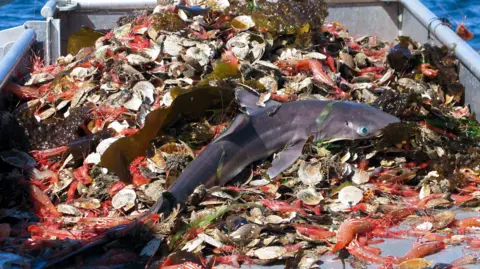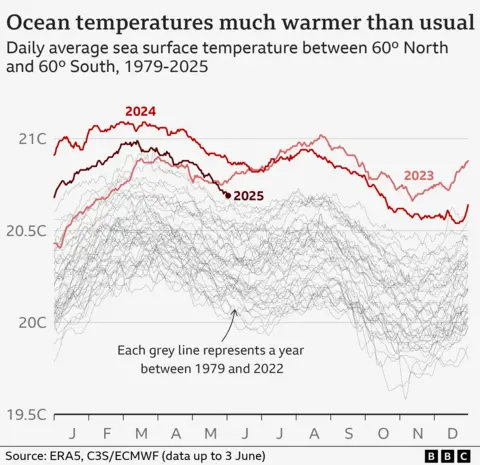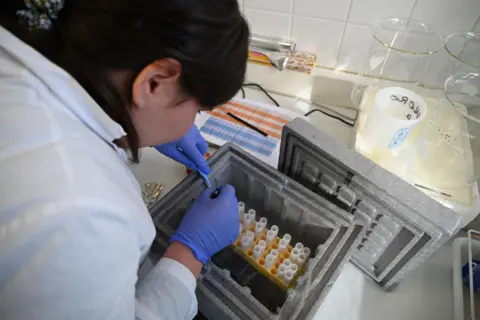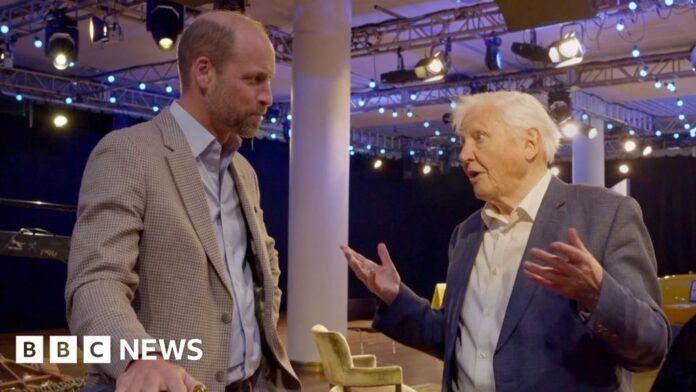Climate and science correspondent
Climate editor
Sir David Attenborough has told Prince William he is “appalled” by the damage certain fishing methods are wreaking on the world’s oceans.
The Prince of Wales interviewed the TV naturalist ahead of a key UN Oceans conference which kicks off on Monday.
The world’s countries are gathering for the first time in three years to discuss how to better protect the oceans, which are facing growing threats from plastic pollution, climate change and over-exploitation.
The UN’s key aim is to get the High Seas Treaty – an agreement signed two years ago to put 30% of the ocean into protected areas – ratified by 60 countries to bring it into force.
“What we have done to the deep ocean floor is just unspeakably awful,” said Sir David.
“If you did anything remotely like it on land, everybody would be up in arms,” he said in the interview released on Saturday. It was conducted at the premiere of his new documentary, Ocean, last month.
The documentary draws attention to the potential damage from some fishing practices, like bottom trawling, for marine life and the ability of the ocean to lock up planet-warming carbon.
Governments, charities and scientists will come together at the UN Oceans Conference (UNOC) in Nice to try and agree how to accelerate action on the issues most affecting the world’s seas.
Sir David said he hopes the leaders gathering for the UN conference will “realise how much the oceans matter to all of us, the citizens of the world”.
Planetary life support system
The ocean is crucial for the survival of all organisms on the planet – it is the largest ecosystem, is estimated to contribute $2.5 trillion to world economies and provides up to 80% of the oxygen we breath.
The key aim for the UN is to galvanise enough support to bring the High Seas Treaty into force – including commitment from the UK.
Three years ago countries agreed to protect 30% of the world’s oceans by 2030, across national and international waters.
International waters – or high seas – are a common resource with no ruling country so nations signed the High Seas Treaty in 2023 agreeing to work together to put a third of them into Marine Protected Areas (MPAs).
Since then only 32 countries have ratified the treaty – 60 are needed to bring it into force.
But many scientists and NGOs are worried MPAs will not be effective whilst practices like bottom trawling are still allowed within them.
 Getty Images
Getty Images“Our ocean is 99% of our living space on the globe, we have huge dependency on the ocean in every possible way, but bottom trawling does a lot of damage,” Dr Amanda Vincent, Professor in Marine Conservation at The University of British Columbia told BBC’s Inside Science.
Bottom trawling or dredging is currently allowed in 90% of the UK’s MPAs, according to environmental campaigners Oceana, and the Environment Audit Committee (EAC) has called for a ban on it within them.
But some fishing communities have pushed back on the assertion that certain fishing practices need to be banned in these areas.
“Bottom trawling is only a destructive process if it’s taking place in the wrong place, otherwise, it is an efficient way to produce food from our seas,” Elspeth Macdonald, CEO of Scottish Fisherman’s Association told the BBC.
Scientists point to evidence that restricting the practice in some areas allows fish stocks to recover and be better in the long term for the industry.

The conference had been called after concern by the UN that oceans were facing irreparable damage, particularly from climate change.
The oceans are a crucial buffer against the worst impacts of a warming planet, absorbing excess heat and greenhouse gases, said Callum Roberts, Professor of Marine Conservation at the University of Exeter.
“If the sea had not absorbed more than 90% of the excess heat that has been added to the planet as a result of greenhouse gas emissions, then the world wouldn’t just be one and a half degrees warmer it would be about 36 degrees warmer.
“Those of us who were left would be struggling with Death Valley temperatures everywhere,” he said.
This excess heat is having significant impacts on marine life, warn scientists.
 Stéphane Lesbats
Stéphane Lesbats“Coral reefs, for the past 20 years, have been subject to mass bleaching and mass mortality and that is due to extreme temperatures,” said Dr Jean-Pierre Gattuso, senior research scientist at Laboratoire d’Océanographie de Villefranche and co-chair of the One Ocean Science Congress (OOSC).
“This really is the first marine ecosystem and perhaps the first ecosystem which is potentially subject to disappearance.”
The OOSC is a gathering of 2,000 of the world’s scientists, prior to the UN conference, where the latest data on ocean health is assessed and recommendations put forward to governments.
Alongside efforts on climate change the scientists recommended an end to deep sea activities.
The most controversial issue to be discussed is perhaps deep sea mining.
For more than a decade countries have been trying to agree how deep sea mining in international waters could work – how resources could be shared and environmental damage could be minimised.
But in April President Trump bypassed those discussions and signed an executive order saying he would permit mining within international waters.
China and France called it a breach of international law, although no formal legal proceedings have yet been started.
Scientists have warned that too little is understood about the ecosystems in the deep sea and therefore no commercial activities should go forward without more research.
“Deep sea biology is the most threatened of global biology, and of what we know the least. We must act with precaution where we don’t have the science,” said Prof Peter Haugan, Co-chair of the International Science Council Expert Group on the Ocean.





